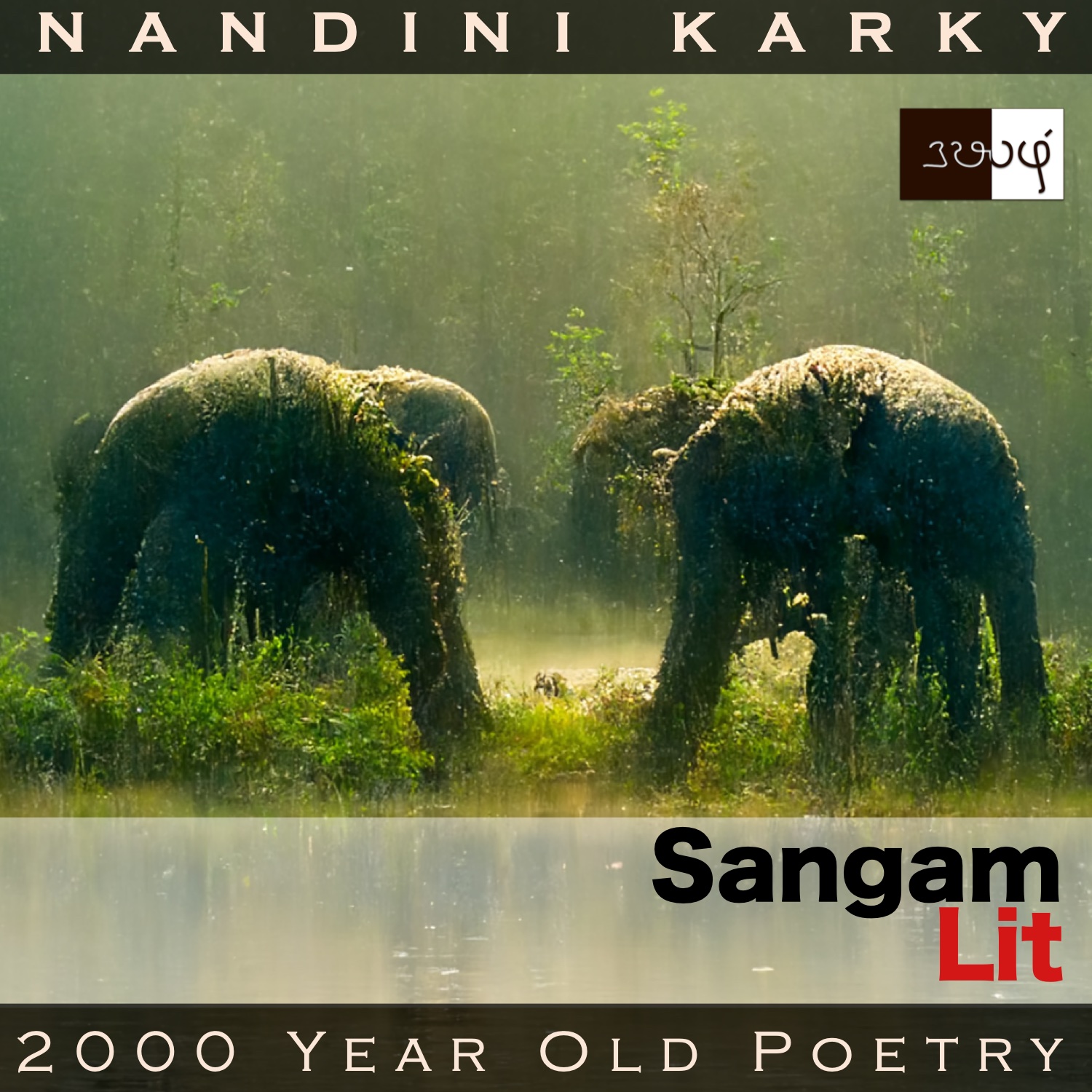Podcast: Play in new window | Download
Subscribe: Apple Podcasts | Spotify | Amazon Music | Android | iHeartRadio | Email | TuneIn | RSS | More

In this episode, we perceive scenes of destruction in war, as depicted in Sangam Literary work, Puranaanooru 23, penned about the Pandya King Thalaiyaalankaanathu Cheruvendra Nedunchezhiyan by the poet Kallaadanaar. Set in the category of ‘Vaagai Thinai’ or ‘a king’s victory’, the verse presents the elements of ruin in the king’s enemy nations.
வெளிறு இல் நோன் காழ்ப் பணை நிலை முனைஇ,
களிறு படிந்து உண்டென, கலங்கிய துறையும்;
கார் நறுங் கடம்பின் பாசிலைத் தெரியல்,
சூர் நவை, முருகன் சுற்றத்து அன்ன, நின்
கூர் நல் அம்பின் கொடு வில் கூளியர்
கொள்வது கொண்டு, கொள்ளா மிச்சில்
கொள் பதம் ஒழிய வீசிய புலனும்;
வடி நவில் நவியம் பாய்தலின், ஊர்தொறும்
கடி மரம் துளங்கிய காவும்; நெடு நகர்
வினை புனை நல் இல் வெவ் எரி நைப்ப,
கனை எரி உரறிய மருங்கும்; நோக்கி,
நண்ணார் நாண, நாள்தொறும் தலைச் சென்று,
இன்னும் இன்ன பல செய்குவன், யாவரும்
துன்னல் போகிய துணிவினோன்’ என,
ஞாலம் நெளிய ஈண்டிய வியன் படை
ஆலங்கானத்து அமர் கடந்து அட்ட
கால முன்ப! நின் கண்டனென் வருவல்
அறு மருப்பு எழில் கலை புலிப்பால் பட்டென,
சிறு மறி தழீஇய தெறிநடை மடப் பிணை
பூளை நீடிய வெருவரு பறந்தலை
வேளை வெண் பூக் கறிக்கும்
ஆள் இல் அத்தம் ஆகிய காடே.
A much sung about Pandya King, whom we have already met in Puranaanooru 18 and 19. In this verse, we see the fury of the king’s actions at war. The words of this poet can be translated as follows:
“Disliking the prior state of being tied onto strong and spotless posts, elephants tore away and rushed to splash and muddy ponds.
Akin to those around the killer of Soor, God Murugu, who wears a garland of leaves from the bur-flower tree, fragrant with the scent of rains, with fine and sharp arrows, your bowmen took what they could. What they couldn’t, they made sure nothing was left to take away in those ruined fields.
Since pointed axes pierced through, all across town, with cuts and bruises, stood the trees in the protected forest. In the streets of the city, soared well-etched fine houses, and here, the cooking fire was silenced by heavy flames that set that house ablaze. Seeing this, enemies were put to shame. And I thought he seems like someone who could do much more harm like this day after day, making sure that no enemy can near him in any way!
As if bending the world, spread out your expansive army at ‘Aalankaanam’ and there, like the God of death, you destroyed your enemies! I came to see you walking through a forest in the deserted drylands, where after the male deer with curving antlers was captured by the tiger, hugging its little fawn, the female deer hopped away and came upon the wasteland fields, where grows ‘poolai’ herbs and was seen eating white flowers of the ‘velai’ plants!”
Let’s step into this disturbing song! The poet starts with what the king’s elephants can be seen doing. These animals are bored of being tied to their posts, and breaking away, they run straight to the once-well-guarded drinking water reservoirs in the enemy nation and by sitting and splashing on the same, make that water undrinkable. As we have seen in other Puranaanooru poems, kings at war seem to inflict this cruel torture of leaving enemy towns without a supply of drinking water.
After water that sustains crops, it’s the turn of food growing in the fields to be destroyed by the bowmen of the king’s army, who claim all that can be claimed there, and then make sure, of what’s left, no one will benefit, for they ruin the fields so.
The next progression of this destruction strikes food being prepared at home for the poet says that cooking fire is silenced because there’s a bigger fire engulfing the house, where the cooking is happening.
Lest I forget, there was one act that made me shake my head in disbelief and that was the slashing of trees in a protected forest with battle axes. I want to ask, what do these soldiers and king gain by hurting these gentle beings that have no way of expressing their pain?
Our fury at the past apart, the king seems to achieved what he wants. For after seeing this ruin, his enemies were ashamed, says the poet, and declares that he thought to himself that the king seems like someone who could do much more, and thereby, keep his foes at bay.
The poet briefly mentions how the king’s army seemed to make the earth entire bend with its weight at Thalaiyaalankaanam, and how the king himself took the form of Death and spelled the end of his foes. Seeing and hearing about all this, the poet seems to have come to visit the king and he talks about a scene he saw on the drylands path in his journey thither. He continues that a deer and its little one were seen eating white flowers from the ‘velai’ plant. Nothing significant about that but the core event is not in this present but in the past of this female deer, whose male was captured by a tiger, at which point the female deer embraced the little one and sped away from there. This scene is the poet’s metaphor for the state of wives of rival kings. Seeing their husbands captured by this Pandya king, they escaped and made sure the young children, the hope of their kingdoms, were well cared for. A verse that seems to echo the thought, be it in war or peace, it’s the protective, providing nature of a mother that makes life go on!




Share your thoughts...